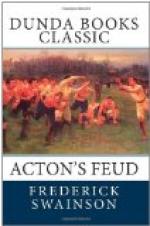Jim Cotton was right. Gus was now a vastly different fellow from the shiftless, lazy, elusive Gus of old; he worked evenly and steadily onward, and, in consequence, his name danced delightfully near the top of the weekly form-lists of the Fifth Form. He, however, did not sap everlastingly, but on half holidays lounged luxuriantly on the school benches, watching the cricket going on in the bright sunshine, or he would take his rod and have an afternoon among the perch in the Lodestone, that apology for a stream. Fishing was Gus’s ideal of athleticism; the exercise was gentle, and you sometimes had half a dozen perch for your trouble. Gus argued there was nothing to show for an eight hours’ fag at cricket in a broiling sun.
CHAPTER XXVIII
ACTON’S LAST MOVE
Phil’s unpopularity had somewhat abated, for his victory in the rackets had given him a good leg up in the estimation of his fellows; but still there was the uneasy feeling that in the matter of the “footer” cap his conduct was shady, or at least dubious.
I was awfully sorry to see this, for I myself was leaving at midsummer, and in my own mind I had always looked upon Phil to take up the captaincy. He would have made, in my opinion, the beau ideal of a captain, for he was a gentleman, a scholar, and an athlete. But the other monitors, or at least many of them, did not look upon Phil with enthusiasm, and his election for the captaincy did not now seem the sure thing it had done a few months before.
At St. Amory’s the monitors elect a captain, and Corker confirms the appointment if he thinks their choice suitable, but he insists that he must be well up in the Sixth, and not a mere athlete.
Now, Phil’s ambition was to be Captain of St. Amory’s, as his father had been before him, and when the home authorities finally decided that I was to go to Cambridge in the Michaelmas term; Phil hoped and desired to step into my shoes. He had one great lever to move the fellows in his favour, he was much the best cricketer in the school and deservedly Captain of the Eleven, and, besides that, was one of the best all-round fellows in Sixth Form work. But Phil did not in the least hint that the captaincy was his soul’s desire; he determined to merit it, and then leave the matter in the hands of the school. So, from the very beginning of the term, he read hard and played hard, and he left his mark on the class lists and the scoring-board in very unmistakable fashion.
And now Acton came like an evil genius on the scene. In a word, he had determined that if he could in any way baulk poor Phil’s ambition, he would. If by his means he could put Phil out of the running for the captaincy it should be done. If he could succeed, this success would make up and to spare for his two former defeats. Therefore, warily and cautiously, he set to work.




